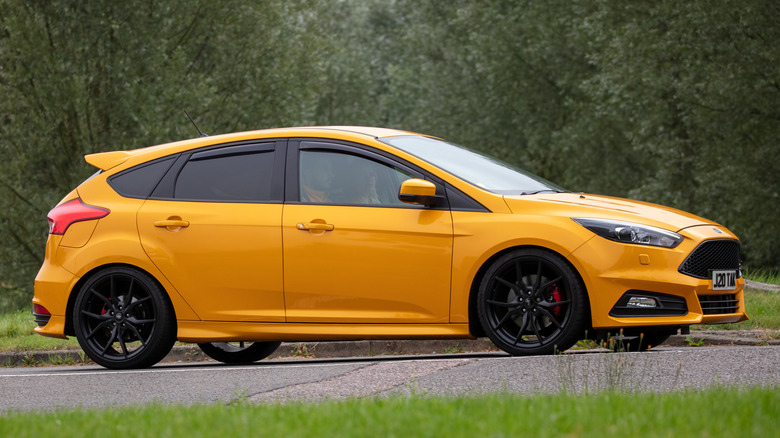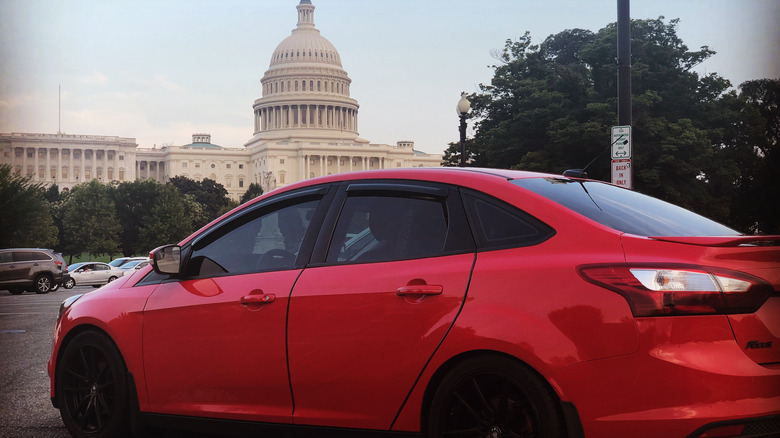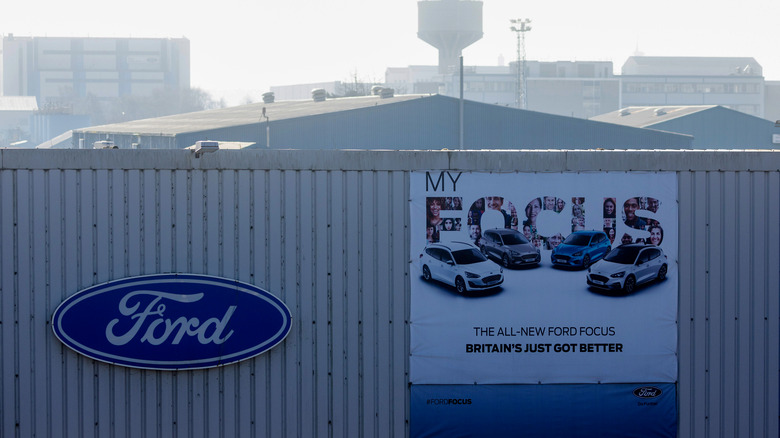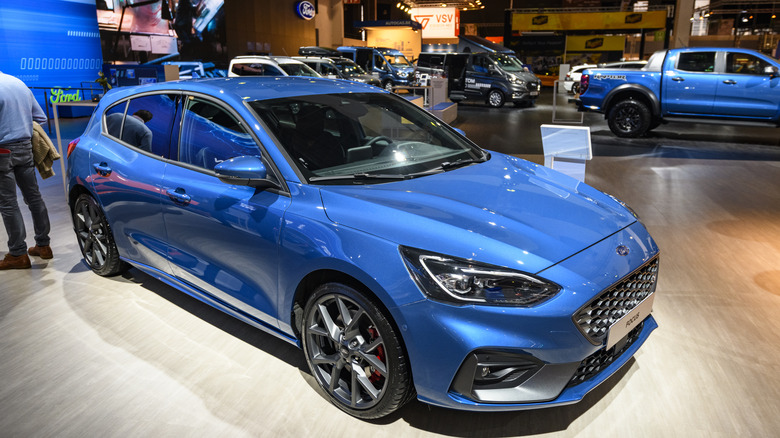Here's Why Ford Discontinued The Focus
Cars don't have to be flashy speedsters to impress. In fact, if it's reliability, practicality, and all-around driver friendliness you prioritize, ludicrous power and top speeds can be something of a detriment. You don't want to arrive at an "all this horsepower and no room to gallop" situation on the school run, as with Jim Carrey's Bruce Nolan in "Bruce Almighty."
The Ford Focus is a fine example of this. Though far from a high-performance sports car in its base guise, this humble hatchback/easy-drive estate has long been a popular pick in the company's roster. Indeed, R.L. Polk data concluded (via USA Today) that the Focus was the world's best-selling car model of 2012. Though it enjoyed a lot of success, its fortunes would slowly deteriorate, and it would finally be discontinued after decades on sale.
Ford announced in 2022 that manufacture of the Focus will cease in 2025.Let's explore just what was and still is so appealing about the Focus, how things have shifted in the long time the model has been on the market, and what part the increasingly-crucial issue of electric vehicles had to play in the decision.
The success of the Ford Focus and the beginning of its downfall
The original Ford Focus arrived in 1998, the chosen successor for the Ford Escort. The goal for any successful compact (or smaller vehicle more broadly) is to strike that tricky balance of practicality and performance: drivers that want a less fuel-hungry engine and smaller form factor don't want their cars to be underpowered for it. The variety the Focus brought to the table, from the very first model, would be key to its success.
Starting at 74 horsepower and hitting 46 miles per gallon, the Focus family would quickly expand in trim and engine options to attempt to cater to drivers of all different sensibilities. Those with a preference for something punchier could consider the Focus RS, which joined the roster in 2002. This model would be familiar to rally fans and boasted performance to match, with a 2.0L 16V turbocharged engine with 310 Nm torque, and that could reach 144 mph.
With the fourth generation of Focus, introduced in 2018, Ford continued to emphasize the versatility of the model, then equipped with the EcoBoost engine family. Some of the options ranged from the Ford Focus ST 2.3L (34.4 mpg) to the 54.64 mpg of the Ford Focus Zetec 1.0L, but that was the problem: The same drive to be greener that would put the Eco in EcoBoost would ultimately help doom the Focus family.
Ford's dedication to the cause of electric vehicles meant that was no longer any place for the Focus
Though many drivers continue to have their doubts about EVs, Ford appears to be doubling down in its dedication to them. Doing so seems to have meant that a fifth-generation Ford Focus is off the table.
This isn't to say that the Focus series hasn't ventured into EV territory itself. The 23kWh Ford Focus Electric, which hit North America in 2011, was seemingly more of an experiment than a statement of intent. It performed rather miserably (Top Gear reports that Europe's sales figures in 2016 totalled 61), and so Ford's EV future lies outside of the Focus.
In June of 2022, it was announced that 2025 would mark the end of the Focus, and that the company's plant in Saarlouis would experience some radical changes. That month, Stuart Rowley of Ford Europe was quoted by Autocar as saying that the company was, "seeking other alternative opportunities for vehicle production at Saarlouis, including [selling to] other manufacturers. We don't have in our planning cycle an additional model that goes into Saarlouis."
In 2021, Ford Europe declared its aim to make "its entire passenger vehicle range ... all-electric by 2030." Why was there no place for another attempt at a Focus EV in this plan? That's because the model's great success had been waning.
The slippery sales slope
As anyone who used to love mullets, troll dolls, flares, disco music, or quoting the Austin Powers movies will know, even the most popular things can go out of fashion. The Ford Focus is another such thing, and the increasing popularity of SUVs did models like the Focus no favors.
2021 and 2022's shortage of crucial semiconductors for car manufacture didn't help the Focus either. As a result of it, Ford Europe's Jay Ward told Driving.co.uk in January 2022, that the company "took a conscious decision to look at our semiconductor availability and marry that up to vehicles that we knew were in high demand." With European sales falling from 10,000 to 5,000 in April 2022 compared to April 2021, the Express reports, it seemed that the Focus was not one of those high-priority cars.
In December 2022, Auto Evolution quoted Ford Europe's Martin Sander neatly summarizing the sentiment that marked the end of the Focus's life: "The market is changing, and the days of sedans and estate cars are over."
In the case of this iconic Ford vehicle, at least, Sander was quite right. Visiting Ford.com's page dedicated to the Focus family today offers little more than a message thanking the visitor for their appreciation of the model, and offering regret that it has now been consigned to the pages of history. What a legacy, though.



